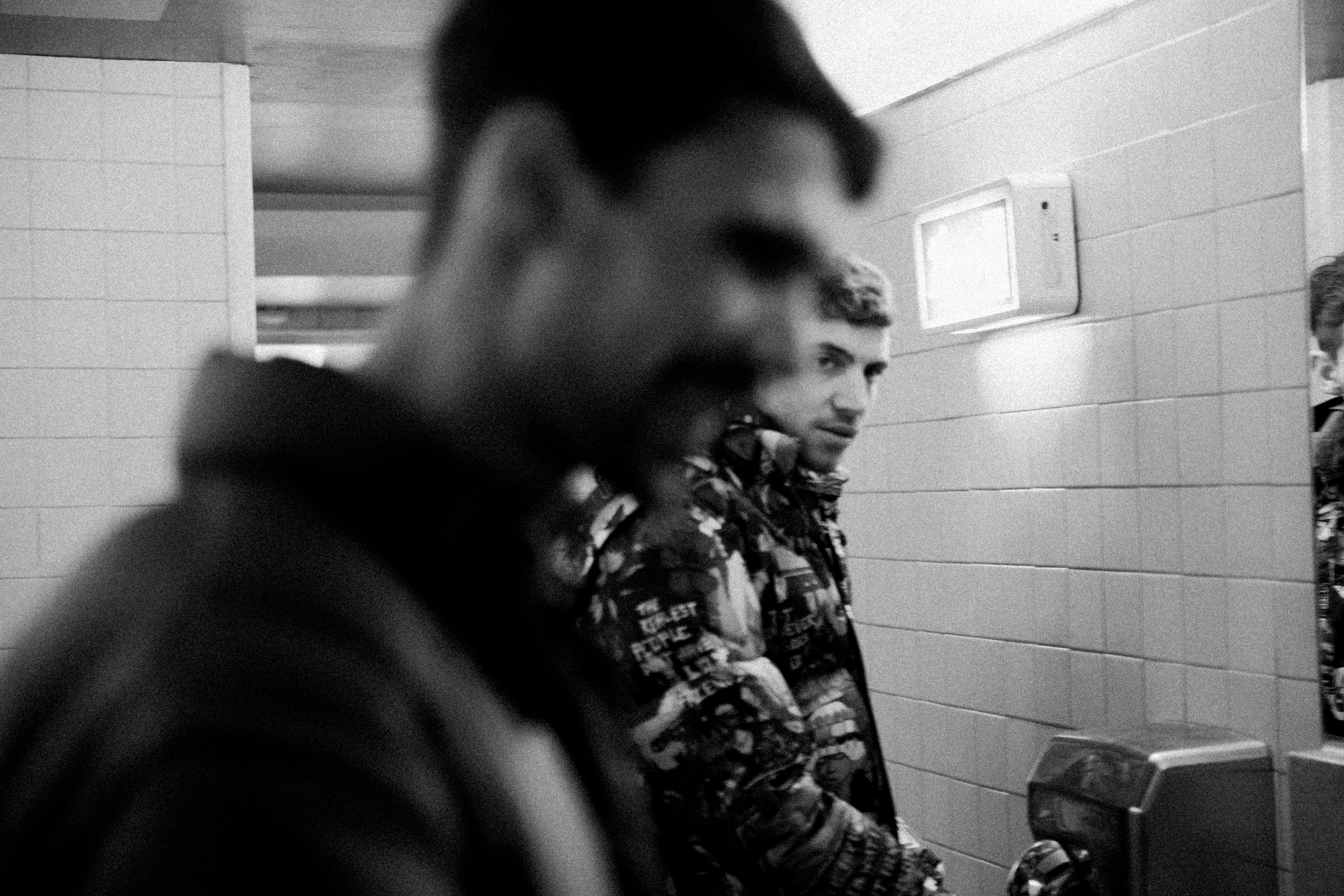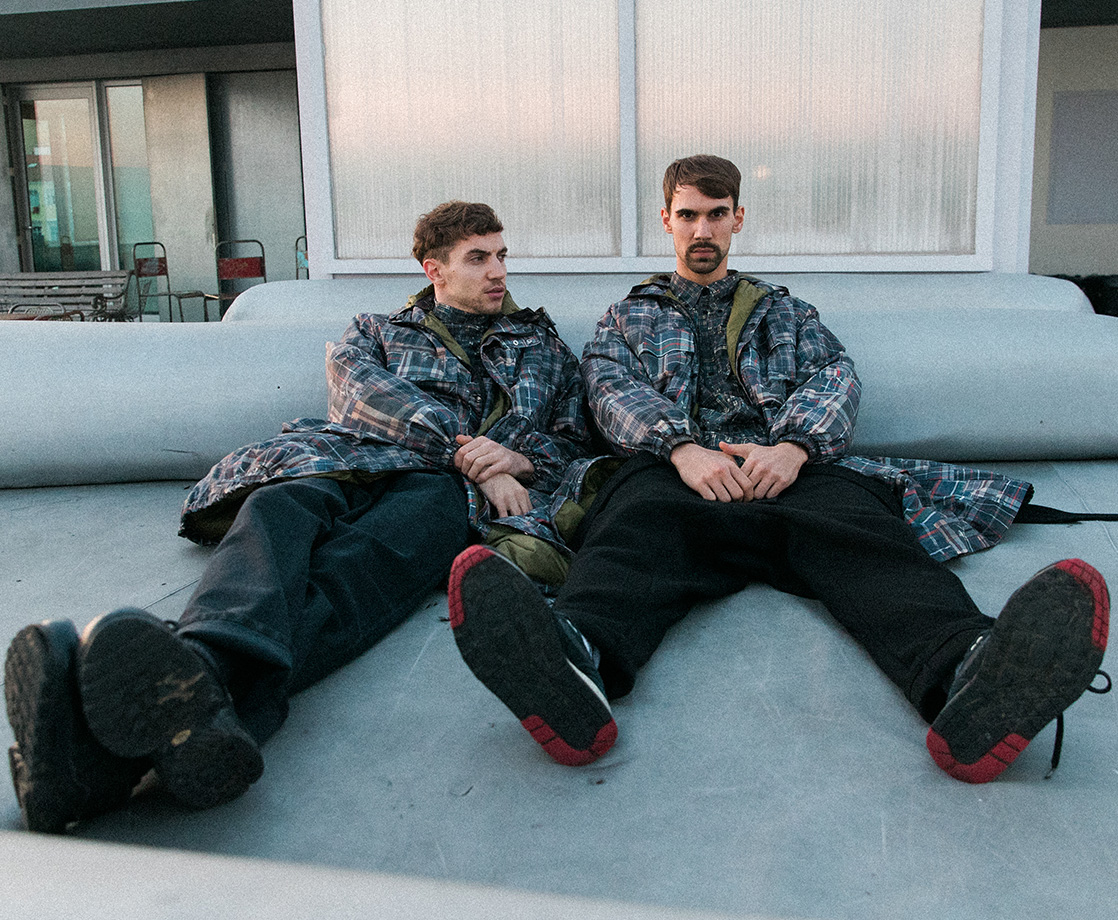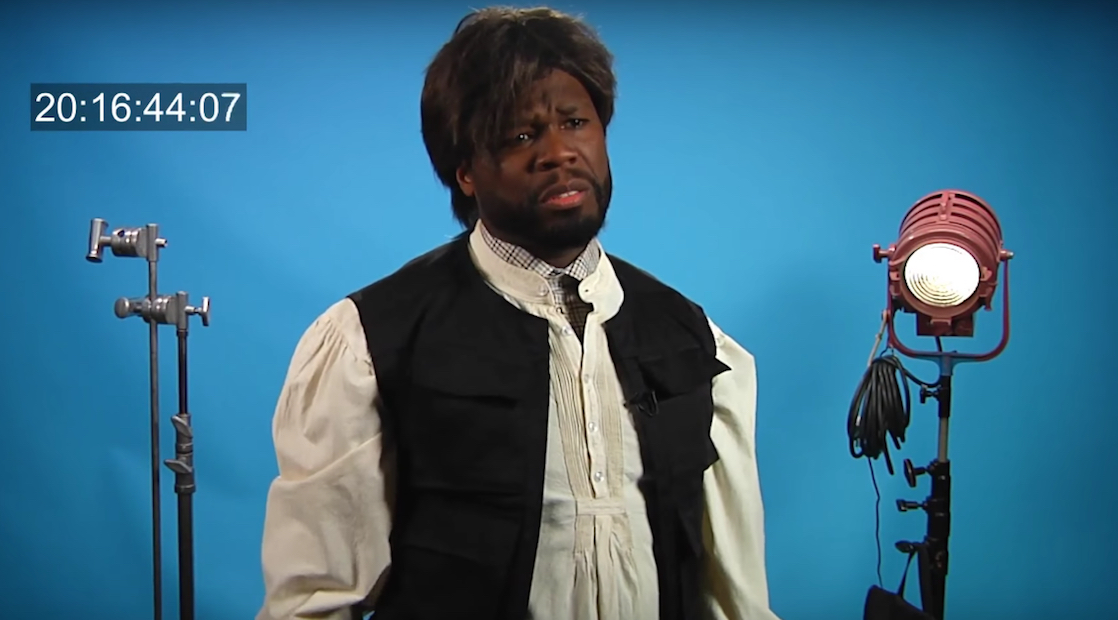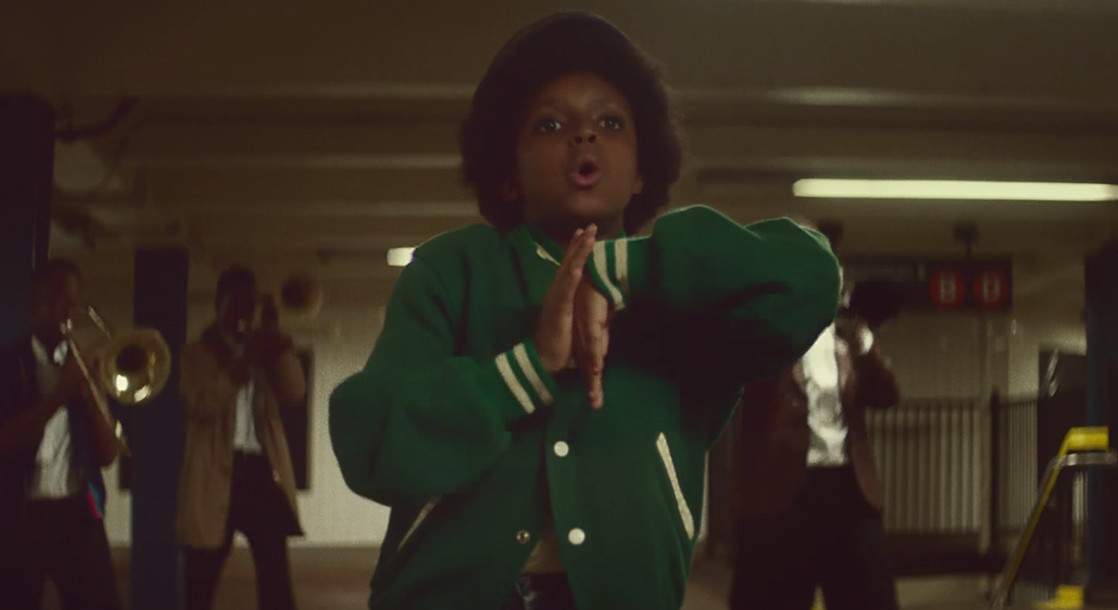Photos by Diogo Lima, courtesy of FJAAK
Felix Wagner is probably the first professional DJ to obtain a German medical marijuana card. The license allows him to travel with up to 15 grams of cannabis throughout the Schengen Area, a coalition of 26 European countries that share a common visa policy and allow international travellers to traverse their borders without a passport. It also lets him pick up grass at any pharmacy in Germany or have the pharmacy deliver it to his door around the clock. Although Germany legalized medicinal marijuana in early 2017, I hadn’t seen or heard of anyone actually obtaining it. That is, until Wagner pulled a prescription container from his bag as we sat down for an interview at the Berlin offices and studios of the electronic music record label Monkeytown.
The permit certainly comes in handy for a heavy toker who travels as much as Wagner does. As a member of the internationally sought-after techno group FJAAK, he travels to dozens of countries for over 100 gigs every year. In 2018 alone he and his bandmate, Aaron Röbig, visited about 40 nations and locales — from Ibiza to Serbia and the Philippines — and they carefully noted the varying prices and availability of cannabis in each one. The habit speaks to the same obsessive, intellectually curious passion that they apply to music, both making it on hardware electronic instruments, as well as playing it to dancefloors around the world.
These twin passions — weed and techno — inform FJAAK’s conspicuous identity in dance music. In the more-or-less “underground” techno scene, which often distinguishes itself from the mainstream EDM industry with self-serious, dramatic press photos and monochrome aesthetics, the FJAAK boys are merry pranksters, impassioned synthesiser savants, and weed evangelists. They’ve built this image in large part on Facebook and Instagram, although their account on the latter platform has been on hiatus since October, following a mass-delete of old posts. They display a millennial fluency in what works on social media: staged press shots with cheeky, sometimes self-effacing captions to dilute the content’s self-promotional vibe; goofy weed-bro shots of them holding baggies in front of the White House, blazing massive joints in front of cop cars, or next to an ass branded with the tattoo “FJAAK you”; and memes, many of which they seem to have made themselves.
The combination has proven irresistible for global dance music fans. Since their first record, Introduction, was released in 2012, FJAAK has grown from the Berlin underground clubland’s youngest hometown heroes — they’re schoolmates from the suburb of Spandau — into one of the most in-demand, hardest-working, and downright fun techno acts in the world.
Their industrious work ethic has allowed them to create and self-release their first full-length album, Havel, while touring constantly. They’ve also simultaneously laid the groundwork for 2019, when they’ll use their clout and platform to share the work of other friends and artists in their orbit under the banner of Spandau 20, which refers to their home neighborhood’s pre-Reunification postcode.

On top of all that, Wagner had to research and present to his doctor a plan for obtaining a medicinal marijuana prescription himself, as most German practitioners aren’t up-to-date with cannabis legality nor its potential health benefits. In pre-legalization, post-medicinal marijuana California, a permanently wired and fast-talking guy like Wagner would probably have been able to cop a medical card if he walked into a doctor’s office and said he had anxiety. But Germany has implemented much stricter standards for determining who’s legally allowed to kiff — to use the German parlance — and carry. It’s so complicated to get a medical marijuana license that most Germans don’t bother to do the extensive research necessary to figure out what conditions are considered acceptable grounds for a permit and which hoops must be jumped through to obtain it. Not Wagner, though.
Since Wagner and Röbig know a lot about their homeland’s marijuana laws, MERRY JANE sat down with them to glean some of their expertise on weed in Germany, as well as how cannabis interacts with their careers as jet-set DJs.
This interview has been edited for length and clarity
MERRY JANE: You’re holding a bottle of medical marijuana.
Felix Wagner: Yeah, it’s medical marijuana. The prescription bottle says it’s OG18, but I don’t trust the label. It’s is an economic product that needs to serve a lot of patients.
Where do they dispense medical marijuana? I’ve never seen a dispensary in Germany.
Felix Wagner: I can go to any pharmacy to get it, and if they don’t have it, they gotta order it for me.
Aaron Röbig: The apotheke [pharmacy] calls him and is like, “Hey, we got five grams of the new kush. Should we bring it to your home or do you want to pick it up?”
Felix Wagner: In Germany, marijuana is classified not as a drug, but as something you give to people when they’re recovering from operations or whatever. So, they would even transport it to my place or bring it at night if I needed it at 2AM. It’s crazy. Also, I only pay one euro for one gram.
Wow. Social democracy is pretty good.
Felix Wagner: It took me a long time to get the medical marijuana license, though. I’m the first DJ in Germany that I know of to have one of these. I’m allowed to travel with it; I can fly with weed within the Schengen Zone.
How often do you get stopped and checked while you’re traveling in the Schengen Zone?
Felix Wagner: So far, never. I can just put it in my bag. They’ve never checked it.
When did you get the card?
Felix Wagner: At the beginning of [last] year.
Is it easy to go to a doctor and tell them you have anxiety or Irritable Bowel Syndrome and get a medical marijuana card?
Felix Wagner: No, not at all. First, I had to collect all the information about how to get one myself, and that took a long time. Then I presented it to my General Practitioner and connected him with another doctor in Germany who had studied the medicinal effects of cannabis more. That’s why it’s really special for me to have one of these [cards]. In some parts of Germany, like in Bavaria, you can go to jail for the night if you’re caught with 0.01 grams. Now I can fly through Munich with my weed whenever I want.
And you feel that cannabis benefits you?
Felix Wagner: I think it’s really good for me. I work day and night for weeks when I’m on tour — I was in California, then back to Germany, then Spain and Holland, and I was writing my final theses, as well. I wouldn’t have been able to do that without weed. As you can see, I talk very fast and I’m really energetic, so it can be hard for me to stick to one thing. But if I smoke a joint and focus on my work, I can work on a single track for 12 hours.
Does smoking all the time make you tired?
Felix Wagner: Not really. Of course, I’ll fall asleep if I smoke several strains. But I’m very sensitive to different strains. For [Aaron], it’s also the same.
Aaron Röbig: Yeah, I feel the different effects of weed. Some will put you to sleep for sure. You have to know which kinds of weed are good for you depending on the situation.
Do you have different strains that you smoke when you’re DJing versus when you’re making a track or going to bed?
Felix Wagner: When I can, I definitely do that. The last time we played in LA, we got to make our day menu. I’m not a 100 percent sativa fan, and he’s not either, so we started with hybrids, some of which were more on the sativa side. During the day, I like to smoke Gelato and maybe something like Wedding Cake — sometimes even 24K.
I get what you mean about weed helping you concentrate. You can definitely get in the zone. But I find that when I smoke weed while partying or DJing, I end up taking more stimulants to counteract it than I would if I didn’t smoke.
Aaron Röbig: Since weed has different effects as time goes on, after an hour and a half or so there’s a period where you start getting tired. If you smoke again after 90 minutes, then you pick up again from that point. But if you let the moment pass, the tired phase of the high sets in.
Do you notice a different high when you use a pen or vape versus smoking?
Felix Wagner: It’s all super different. Every strain is very individual. The vape doesn’t come on strong [at first], but that’s why people get super high when they use it.
Aaron Röbig: For a shorter time, though. You get a longer high from smoking [flower].
Felix Wagner: To me the vape does this. [Makes a waveform with hand that has a slow but steep attack and a quick decay.] A joint is more like this. [Makes a waveform with a quicker attack and a longer sustain and release.]
You could describe different highs in terms of sound envelopes. The vape has a slower but exponential attack and a quicker decay than a joint.
Felix Wagner: Yeah, every high generates a different envelope!
When did you start smoking weed?
Aaron Röbig: 16, 17.
Felix Wagner: I didn’t really smoke after my first time for about a year. In Germany, it was really considered a bad thing. Berlin is kind of liberal, but we grew up in Spandau, where people used to take a lot of drugs. We saw a lot of hard drugs but never took any of them — even weed. At one point, my parents came to me and were like, “Hey, we noticed that you started to drink with your friends at bars and clubs. That’s fine, but… have you ever tried weed?” I was like, “What the fuck is going on?” They said, “We just think that alcohol is really not good for your brain or your lifestyle; you’ve started to sleep till 2 PM.” They were right! I can smoke a fat blunt at 3AM and then wake up at 6:30AM to get ready. I’ve never missed a flight. We always get our shit done.
Aaron Röbig: Definitely. When we started smoking weed, it was not cool in Germany. A lot of people at school were like, “They’re the fucked up weed smokers.” First, we were known around school for smoking weed, then we were known for making music. We were known as guys who hung around in a cellar smoking bongs. But the perception of the type of person who smokes weed has changed quite a lot in the last 10 years. Now young people are more open-minded about it, and it’s cool to smoke weed.
Felix Wagner: When I started smoking weed, I quickly realized that I don’t want to pay some guy a BMW car [for weed] just because he’s a big drug boss. I was also smoking bad weed and making it last, stretching it. I was always looking closely at the product and talking to people with more experience because I was thinking about how I put this inside my lungs. I mean, you wouldn’t buy beers from some guy on the corner who slips you the bottles from under his jacket.
That’s a big argument against prohibition in general, right? The production can’t be controlled and the consumer doesn’t know what exactly they’re buying.
Felix Wagner: Yeah. It should be controlled [and regulated]. My older friends were flashed that I was even asking them about how to grow. I was just like, “Yeah, you know, I smoke stretched weed because I pay 10 euro for one gram.” We used to get two grams for 10 euro; now you get one gram for 10 euro [on the black market].
Why do you think prices went up in Berlin? Party tourism?
Aaron Röbig: I think it’s a natural consequence of people wanting to make money. They’re seeing how much they can get.
Felix Wagner: People grow it en masse — it’s quantity over quality. And no one checks or controls it. If you’re a grower or dealer and some competition pops up, you have to start going for quantity.
Aaron Röbig: They start with two grams for 10, and then they go, “Hm, maybe we can sell it for 1.5 grams for 10.” People kept buying, so they were like, “Okay, we can do one gram.” Sometimes they’re doing a half gram for 10 euro.
That’s only if you buy it at Görlitzer Park or something.
Felix Wagner: It’s crazy that the police know that there’s 40 people selling illegal material there, but they don’t often do anything about it. I was stopped by the police just one week ago. But I was able to keep all my weed because I’m legally allowed to have it.
Where’d you get stopped by police?
Felix Wagner: Gernot [Bronsert of Modeselektor] had a small private party for his birthday just outside Berlin. When we were at the border of Berlin on our way back, we passed through a sobriety checkpoint. The police officer said, “Well honestly, the car really smells like weed, so now we gotta check all of you.” I pulled out the prescription, and the police were so flashed. They had to call the station like, “We have a guy here who tells us he got weed on prescription, and it looks real. Yeah, really? You serious? Oh, okay.” And then they came back to me like, “You can keep it.” One of the cops even came up to me like, “Man, how did you do this?” He was kind of interested to get a prescription for himself.
You guys attract a lot of trouble. I’ve never been stopped by police here.
Aaron Röbig: Sometimes you get bad luck.
Well, you guys also post photos on social media of you smoking by cop cars and stuff. You seem to tempt fate a little.
Felix Wagner: Yeah. First, it’s funny. But we also wanna show that smoking weed isn’t a bad thing to do. We’re not hurting anyone. We want to put this issue in the spotlight. I would play at a big cannabis parade and donate the money to legalization [advocacy].
Aaron Röbig: I think everyone in Berlin is just waiting for the moment weed is legalized. After that, nobody will talk about Amsterdam anymore. People who live in Amsterdam aren’t really interested in weed because it’s considered a touristy thing. But in Berlin, everybody smokes weed; it’s normal here now. I bet all the spätkauf [corner stores] would change overnight to coffeeshops if it’s legalized.
If weed became legal in Germany, would you want to get involved in the industry?
Felix Wagner: Definitely. Of course, right now we’re going to do music.
Does the fact that you very publicly smoke weed make you nervous? Especially given that you travel all over the world, including to places where it’s much more stigmatized and stringently punished.
Aaron Röbig: I’m quite comfortable. People give us weed wherever we go!
Felix Wagner: If we’re somewhere that might check us, we won’t have it on us. I wouldn’t bring it to Japan, for example.
Is California one of your favorite places to smoke? What are the best places to get weed in the world?
Felix Wagner: California was one of my favorite places even before weed was legalized there.
Aaron Röbig: Barcelona is the best in Europe.
Felix Wagner: In South America, Uruguay is the best deal: one dollar for one gram.
Aaron Röbig: Yeah, but South America and Asia are not the best for weed in general.
Felix Wagner: Genau. It’s crazy, but Berlin, to me, is almost the same level as California. People are just growing for themselves and exchanging information and experiences [about cannabis] with friends. In that way, it’s kind of like learning to make music.
So speaking of music, then — what are you working on right now?
Aaron Röbig: Right now we’re working on a new label [that’s separate from the eponymous FJAAK label]. We just put out our recent album on our own label.
Felix Wagner: We’re gonna put so-far-unknown, very talented people into the spotlight. We want to focus on those guys and make a big team. And it’s not only music; we wanna do some interdisciplinary stuff, like art and audio-visual stuff.
Aaron Röbig: Maybe we’ll do a big tour with just our friends. The label is gonna be called Spandau 20 because that was Spandau’s postcode before Reunification. The idea is that the year 2020 will be the year of Spandau 20.
For more on FJAAK, follow them on Instagram, Facebook and SoundCloud.











